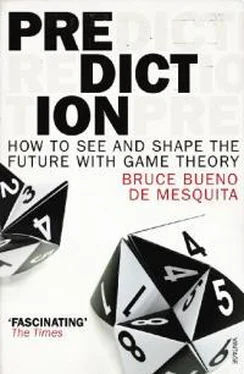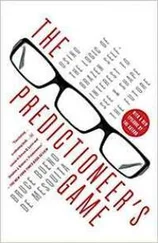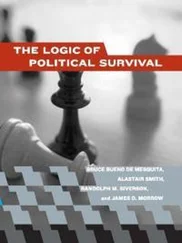The model indicates that Austria-Hungary and Germany expected war over Serbia for the first few weeks of the crisis, while Serbia shared that expectation. Austria actually declared war on Serbia at the end of July while professing to have no quarrel with others. By the start of August the model anticipates that Serbia was relegated to a relatively minor role as events ran ahead of Austria-Hungary and Germany’s ability to cope with them. Germany in fact declared war on Russia on August 1, and the war anticipated by the model’s logic actually began.
Was war inevitable? Emphatically the answer must be no ! First, we can see in the figure that had the contending parties sustained negotiations one or two months longer, postponing the decision to go to war, the Germans would have better comprehended the dangerous big picture. They would have (according to the model’s predictive logic) broken ranks with the Austrians and come to agreement with the British and their allies. The Austrians would have gotten the majority of what they wanted under the agreement that the model indicates could have been reached in September or October 1914. Of course, this agreement needed the diplomats to remain in charge instead of turning choices over to the generals. The deal that could have been struck would not have included the surrender of Serbian sovereignty. But all that is beside the point since, alas, the game simulation suggests correctly that the diplomats would not have continued negotiating through the early fall. The diplomatic game ends before September and a new game, war, begins.
The beauty of a model is the freedom it gives us to ask lots of what-if questions. We can replay the World War I diplomacy game, just as I did in an earlier chapter for a litigation client, while changing how players present themselves. That way we can see if this or that player could have approached the game better, producing a happier result from its point of view.
Let’s replay the 1914 crisis, this time making the British diplomats more skillful than they actually were but no more skillful than they could have been. I am going to let them look inside the model’s approximation of what was going on in the heads of the German and Austrian decision makers. In this way I am going to pretend that they had a little army of mathematicians doing the calculations my computer does for me. This will make it easier for the British to be more thoughtful and decisive, instead of as wishy-washy as they were.
The historian Niall Ferguson has argued that a big factor leading to war in 1914 was that the Austrians and Germans were uncertain of British intentions and that this uncertainty was caused by the British. 3Britain may have done well for a long time by muddling through, but that was not much of a strategy in 1914. Did the British really intend to defend Serbia, or were they bluffing? Certainly nothing they said or did at that time was sufficient to convince the powers of the Dual Alliance that defending Serbia was really important to Britain. This was an important failing on their part, and it deserves further exploration.
Remember that when we looked at a lawsuit I worked on, we examined the consequences that followed when I advised my client to bluff having a stronger commitment to their bargaining position than in fact they had. Such a bluff can be risky and costly. If the other side believes—correctly—that a tough posture is just posturing and not the real thing, then they will call the bluff. In the lawsuit, that would have raised the odds of a costly outcome. The client would have faced severe felony charges. They might have been exonerated in court, but trials are, as we’ve seen, always risky business. Without bluffing, they were going to face those charges anyway, so bluffing looked (and proved) attractive.
Think how much costlier and riskier bluffing could have been for Britain in the summer of 1914 than it was for my client in the lawsuit. With hindsight we know that the guns of August were not stilled for more than four years. At the end of the war, the United States—not Britain, not France, not Germany, and not Russia—would be the greatest power in the world. At the end of the war, Austria-Hungary would not even exist. But when decisions had to be made, no one knew any of that. They had to think about what their circumstances would look like if they showed eagerness to compromise or if they showed real resolve to stick to their guns, so to speak. The British looked for compromise, and disaster followed. What does the model say would have happened had they bluffed being resolved to defend Serbia, and how could they have conveyed such resoluteness?
The British were in an odd position. It seems that even they were unsure how resolved they were. They were uncertain not only about others, but apparently even about themselves, about what they should or would do. That, presumably, is why the Austrians and the Germans did not read British diplomacy as signaling real commitment to defend Serbia. We also know that when the Russians—believing they were facing an imminent attack—mobilized, this prompted the Germans to do the same, and war began. The Russian mobilization certainly showed their commitment, but it did nothing to improve the prospects of a negotiated settlement. Their mobilization was a very costly “costly signal.” Would British mobilization have had the same dangerous consequences, or could it have broken the impasse?
The data going into the model treat Britain as highly committed to finding terms that all sides can accept. They were assigned a value of 90 out of a possible 100 on “flexibility/commitment,” indicating they really wanted to negotiate and were prepared to live with a major compromise to avoid war. I have repeated my earlier simulation of the crisis, but with one change. I shifted Britain’s commitment to compromise from 90 to 50. A value of 50 signals a balanced approach. A value of 50 means the player actively pursues a settlement but is sufficiently resolved that it will not make a deal very far from its desired outcome. By placing Britain at 50 I am, in essence, trying to test Niall Ferguson’s insight (and that of other historians too) that the wishy-washy British message contributed to the war. I am simulating an approach that the British leaders probably would have seen as a bluff intended to shake up the situation and promote a war-avoiding deal.
What concrete actions might the British have taken to send the message, “We are serious about defending Serbia’s sovereignty”? I am not a military expert, so my speculation will be just that. I am sure a military specialist or historian of British policy in the run-up to World War I would find countless other ways for the British to send the right message. Here is one:
Britain was the world’s greatest sea power (although the Germans were certainly challenging that claim at the time). They could have filled several of their navy’s ships with a few thousand British troops to be transported to the Adriatic, taking them just a short distance from Serbia. Maybe they could have sent some other ships into the Bosporus, roughly flanking landlocked Serbia from either side. This would have served several potentially advantageous purposes. It is very much, in game-theory lingo, a costly signal. Talk is cheap, but sending a fleet into a prospective combat zone is putting your money where your mouth is.
The Germans and Austrians probably would have taken more seriously the prospect that Britain meant business. As we will see, the model indicates just that. Additionally, a naval mobilization of this sort has none of the grave risks associated with the Russian mobilization of ground forces. Russia could move troops quickly to and across the German frontier. Understandably, that made the Germans more than a little jittery. British ships filled with soldiers would have taken a long time to get into position. Finally, the ships would not have been directly in the path on which initial fighting was expected. Thus the shiploads of troops would very much have been a signal of what was to come without precipitating immediate military action. In reality, British ships under French command headed for the Adriatic a few days after war had been declared: too little too late.
Читать дальше











